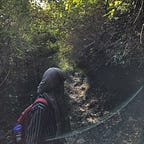Will you touch the purple snake?
“Knowledge is power”. The famous saying goes.
But power corrupts! Another one claims.
The latter seems to antagonize the former but if you are familiar with the fallacy of equivocation, it helps in actually proving its point. Wonderful, no? By having more knowledge, you are able to completely reverse the relation between the two sayings.
But what if there is an impressionable human being who wants to be morally upright and is unfamiliar with something called equivocation? He may read the two statements and pledge to never learn something again. Exaggerated? Maybe.
Knowledge is vital. It can play a role in determining our approach to a subject matter. When presented with a choice, our first consultant for making a decision is our own knowledge. What do we know about that thing? We lay out all the facts and fiction we’ve gathered all our life (consciously or unconsciously) about the subject. We measure them, scale them, weigh all the possible consequences and finally go with what looks ‘most promising’. The time this whole process takes obviously depends on the type of decision and at times, on the decision-maker too.
But the process itself involves two variables:
- The facts and fiction
- We, ourselves
If the facts and fiction I have gathered in my life differ from yours, it can be imagined that our approaches to the matter in hand will be different too. On the other hand, if we know pretty much the same things about the said matter, it still can’t be said confidently that we both will make the same decision. Because we are not the same person.
Knowledge is so important because it has the ability to alter us as beings, as personalities. How many souls have wondered if they only knew better at some point in their lives!
However, we all know people who if given all the insight about their choices and how they will affect them in the future, will still go for the ‘poorer’ decision. This is because we can always choose to ignore what we know and go for what we wish anyway. It can be for all kinds of reasons. Emotional, rebellious, adventurous and whatnot.
Though our knowledge about a thing directly affects what we think of it, it is not what defines us wholly. It is a skill set, we can say. The one who has got the more sophisticated skill set will be able to navigate through situations more decently, but only if he uses it and even more importantly, uses it correctly.
It goes back and forth. All the things you learn and come to know for a fact guide you in moving on. But as you move further on, you learn new things and assimilate new findings. Both about yourself and about the world.
Let’s say that you come across a purple snake. This purple snake is a fact. A piece of information. A stimulus. Your response to this purple snake is what essentially reflects your knowledge of purple snakes. And a lot about you, too. For example, let’s assume that the society you come from believes that touching a purple snake will bring extremely good luck. Now you may like to touch it. But the story is incomplete. You have studied about superstitions and this whole snake-touching sounds like one. Add to this the fact that there is no other human being around to judge you if you touch the snake. What will you do?
If you don’t touch the snake, you are relying on your knowledge of superstitions. Also, snakes can be deadly. So why take a risk, right? On the other hand, if you do touch it, you are placing confidence in your ‘local wisdom’.
Whatever you choose, you will be strengthening that perception of yourself (again a form of knowledge) in your mind. You either become more of a person who is skeptical or more of a person who favors his social beliefs. Next time someone asks you if you are skeptic or superstitious, it won’t be as hard to answer as it would have been before that snake-encounter!
